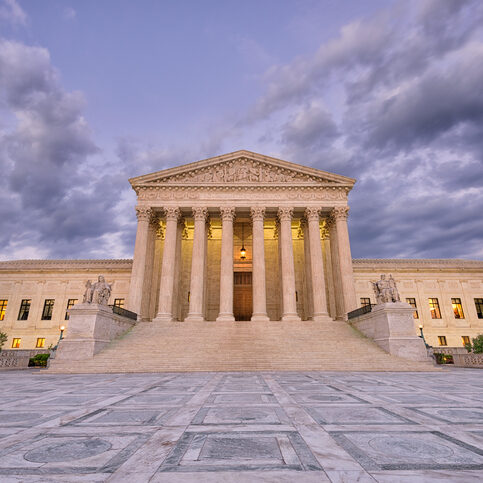Insights < BACK TO ALL INSIGHTS
Chevron Overruling Sparks Regulatory Uncertainty Across Industries
FEATURED
July 10, 2024
Chevron Overruling Sparks Regulatory Uncertainty Across Industries
By: Jake Gray
A landmark decision by the Supreme Court overruled 40-year precedent that provided the bedrock for modern federal agency rulemaking and administration. In Loper Bright Enterprises v. Raimondo (2024), alongside its companion case Relentless, Inc. v. Department of Commerce, the Supreme Court overruled Chevron U.S.A. Inc. v. Natural Resources Defense Council, Inc. (1984), holding that deference to an agency’s interpretation of the statute is inconsistent with both the Administrative Procedure Act (APA) and the judiciary’s function in interpreting statutes and determining questions of the law. The decision commences an era of potential regulatory uncertainty with broad implications for many industries regulated by the federal government and its agencies, while also formalizing what the Court noted as an existing tendency to selectively…
What are you looking for?
Ready, Set, Go: More States Adopt Privacy Laws
July 8, 2024
Ready, Set, Go: More States Adopt Privacy Laws
By: Nicole Kardell
Note the below chart was updated on July 8, 2024 to reflect recent developments. The number of U.S. states that have adopted privacy laws grows regularly. Fortunately, there seems to be quite a bit of crossover, at least when it comes to thresholds that companies must meet in order to trigger compliance requirements. We provide below a chart that summarizes these thresholds by state, including…
The Supreme Court Strips Nonconsensual Release Power from Bankruptcy Courts
June 28, 2024
The Supreme Court Strips Nonconsensual Release Power from Bankruptcy Courts
By: George Calhoun
In a divided 5-4 decision, the Supreme Court held yesterday that “the bankruptcy code does not authorize a release and injunction that, as part of a plan of reorganization under Chapter 11, effectively seek to discharge claims against a non-debtor without the consent of affected claimants.” Harrington v. Purdue Pharma, L.P., __ U.S. __ (2024). Although there is a long history of nonconsensual third-party releases…
Ticketmaster’s Cruel Summer – the potential implications of a DOJ lawsuit against the ticketing platform and why concert fans may not be out of the woods yet.
FTC Tells Advertisers – Fake Reviews and Endorsements Are Going to Cost You
October 14, 2021
FTC Tells Advertisers – Fake Reviews and Endorsements Are Going to Cost You
By: Michelle Cohen
Does your company or its affiliate advertisers use celebrities or influencers to market your services? Do you use customer reviews to promote your offerings? The Federal Trade Commission (“FTC”), energized by new Chairperson Lina Khan, just sent out notices to over 700 companies – including many household names (https://www.ftc.gov/system/files/attachments/penalty-offenses-concerning-endorsements/list-recipients-endorsement-notice.pdf) warning them about using fake reviews and other misleading endorsements in advertising their products and services….
Supreme Court rules that FTC cannot seek disgorgement under Section 13(b) of the FTC Act
July 12, 2021
Supreme Court rules that FTC cannot seek disgorgement under Section 13(b) of the FTC Act
By: Ifrah Law
Last October, we reported on the Third Circuit Court of Appeals’ decision in Federal Trade Commission v. AbbVie, Inc., in which the appeals court overturned a trial court’s decision ordering $448 million in disgorgement pursuant to Section 13(b) of the Federal Trade Commission (“FTC”) Act against a group of businesses accused of trying to monopolize and restrain trade over a patented drug called AndroGel. At…
Plot thickens in FTC disgorgement debate, as $448 million award is reversed
October 2, 2020
Plot thickens in FTC disgorgement debate, as $448 million award is reversed
By: Ifrah Law
As previously reported in this space, the Supreme Court is scheduled to hear argument in its upcoming term regarding whether the Federal Trade Commission was authorized to seek monetary relief such as disgorgement or restitution under Section 13(b) of the FTC Act. These cases do not just call into question the availability of a certain remedy; they may also have far-reaching impacts on the FTC’s…
SEC “Kiks” Another Goal In Ongoing Fight Against Cryptocurrencies
October 1, 2020
SEC “Kiks” Another Goal In Ongoing Fight Against Cryptocurrencies
By: Ifrah Law
In the latest blow to businesses seeking to offer digital tokens or cryptocurrencies to consumers, the United States District Court for the Southern District of New York ruled on Wednesday that Kik Interactive Inc.’s offering of its Kin digital token violated Section 5 of the federal Securities Act, granting summary judgment to the Securities and Exchange Commission in its lawsuit against Kik. Kik operates an…
Civil or Criminal Liability: Charging A Payment Processing Case by Coin Toss?
August 17, 2020
Civil or Criminal Liability: Charging A Payment Processing Case by Coin Toss?
By: James Trusty
In the eyes of federal investigators, when is a payment processor considered a benevolent alternative to traditional banks, and when is it viewed as a shady facilitator of all things criminal? In other words, is the client another Paypal or Venmo, or are we looking at a potential WireCard AG prosecution? We have noticed in recent cases that prosecutors are across the board in their…





